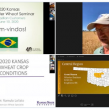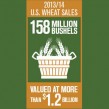Breadcrumb
- Home
- Recent news stories
- Brazil Turns With Confidence to U.S. Wheat
Brazilians love bread. Their tradition of eating artisanal French-style white breads is slowly being replaced by growing demand for whole grain breads and other wheat foods perceived to be healthier.
With high demand, Brazil cannot produce enough of its own wheat so it imports more wheat than most other countries — 224 million bushels every year on average and mainly from Argentina. Under the Mercosur trade agreement, Brazil’s millers can import wheat from there without having to pay a tariff of 10 percent or a substantial “Merchant Marine Renovation” tax.This year is different. This year, Brazilians are eating a lot more bread and other food made with U.S. wheat. In fact, in the 2013/14 marketing year, Brazil imported more than 158 million bushels of U.S. wheat worth more than $1 billion! Why? Because Argentina’s political situation and poor crop severely cut exportable supplies. And because U.S. Wheat Associates (USW) represents the U.S. wheat farmer, the world’s most reliable supplier. With funding from state wheat checkoff programs and USDA’s Foreign Agricultural Service, USW keeps Brazilian millers informed about the quality, variety and value of U.S. wheat every year.
The Argentine government tightly controls the local wheat supply. Wheat planted area for 2012/13 was already down when the December 2012 crop bottomed out at 40 percent less than the year before. To keep domestic prices down, the government cut the amount of wheat it would allow to be exported.
Using information from USW in regular trade service calls and at their annual association meeting, Brazil’s millers then asked their own government to suspend the 10 percent tariff on non-Mercosur wheat imports. Fortunately, the government announced in February it would suspend the tariff starting in April 2013, giving U.S. wheat farmers — and USW — an opening.
Quickly, USW representatives in the South American regional office in Santiago, Chile, organized an April trip for executives from the largest Brazilian milling company to Manhattan, Kansas, to visit the Kansas Wheat Innovation Center, the International Grains Program, the USDA Center for Grain and Animal Health Research and a local wheat farm. One of the buyers said the trip helped his company “be more prepared to work with U.S. hard red winter wheat in our milling operation.” By October 2013, that mill had purchased more than 37 million bushels of hard red winter (HRW).USW cast a wider net in August 2013 with seminars for flour mills representing 60 percent of total Brazilian wheat imports. In São Paolo, USW representatives showed purchasing managers how best to manage risk and specify for the best value in U.S. HRW and soft red winter (SRW) wheat. In a separate seminar, milling managers gained technical information to help adjust their systems to get the most yield and highest quality flour from U.S. wheat.
In April and May of 2013, Brazil imported 13.4 million bushels of HRW and SRW, or about the same amount of U.S. wheat Brazil usually imports for an entire year. The orders kept coming even after the government re-established the import tariff in November 2013. At the end of 2013/14, U.S. commercial sales (delivered or booked) totaled more than 151 million bushels of HRW, which represents about one-third of total HRW sales for the entire 2013/14 marketing year, and more than 7.2 million bushels of SRW.
The work USW did before 2012/13 and its efforts since then gave our customers in Brazil comfort with our wheat supply system, quality and value. It helped spur millers to actively buy most of their wheat from the United States. And it helped return more than $1.2 billion to the U.S. wheat industry in just one year from an investment of less than $100,000 in market development spending.
The potential for an on-going increase in exports to Brazil is strong and USW does not take this opportunity for granted. We will conduct additional activities including sponsoring events at the milling association’s annual meeting, custom technical service and trade policy activities. Can Argentina, Uruguay or Paraguay meet Brazil’s growing demand for a wider variety of high-quality wheat in the future? That remains to be seen. But what Brazil’s buyers now know is that USW and the wheat farmers we represent will always be there to supply the wheat and the knowledge they need to succeed.
by U.S. Wheat Associates
KWC held its first ever virtual trade team on June 10 with customers from Brazil. These customers had the opportunity to learn more about the current wheat crop, growing conditions and updates about... A better year would be good for our farmers and for our overseas customers, too, who want farmers to have the incentive to continue producing a reliable supply of high-quality U.S. wheat. A significant impediment to U.S. wheat sales to the large Brazilian market is likely to end soon. Brazil’s government has announced it intends to implement a tariff rate quota (TRQ) allowing up to... Kansas Wheat CEO Justin Gilpin recently presented quality data about hard red winter wheat at seminars in South America. Even before winter storm Ursa crippled the western third of the state, Wheat Streak Mosaic Virus had already moved into the area. U.S. Wheat Associates' education and engagement with millers in Brazil helped generate $1 billion in sales during the 2013/14 marketing year on a $100,000 investment. Read the full story here.

Kansas Wheat hosts virtual trade team with customers from Brazil
June 18, 2020

Will Shifting Market Factors Hibernate the Bear Market in Wheat?
January 9, 2020

Long-Sought Opening of Brazilian Wheat TRQ
November 11, 2019

USW Hosts Seminars to Help Customers Make Purchase Decisions
October 31, 2019

2017 Wheat Tour, Day 2: Western Kansas hit with one-two punch, WSMV and snow
May 3, 2017

$1 billion success in Brazil for U.S. wheat
November 20, 2014
